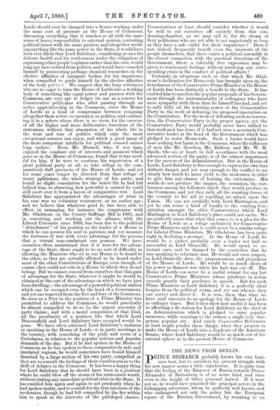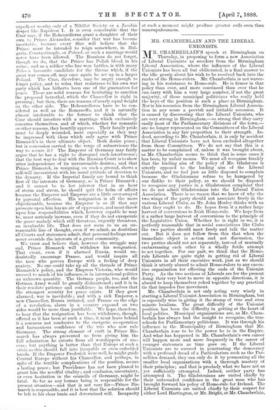THE NEWS FROM BERLIN.
PRINCE BISMARCK probably knows his own busi- ness best, but to outsiders his present struggle with his new master seems a little injudicious. It is quite true that the feeling of the Emperor of Russia towards Prince Alexander of Battenberg is of an acute kind, and rises even to the height of bitter personal hatred. If it were not so, he would have punished the principal actors in the kidnapping adventure, whom he perfectly well knows, and. who endangered not only the policy but the European repute of the Russian Government, by resorting to an expedient worthy only of a Nihilist Society or a Jacobin despot like Napoleon I. It is even conceivable that the Czar may, if the Hohenzollerns grant a daughter of their own to Prince Alexander, consider that war has become inevitable, because every Slav will believe that the Prince must be intended to reign somewhere, in Bul- garia, Constantinople, or Poland, or such a marriage would never have been allowed. The Russians do not forget, though we do, that the Prince has Polish blood in his veins ; and as a soldier who has won battles, is with many Poles a favourite candidate for the throne which, if the great war comes off, may once again be set up in a larger Poland. The Czar, therefore, may be angry enough to forget policy, and to relax that resistance to his own war party which has hitherto been one of the guarantees for peace. Those are solid reasons for hesitating to sanction the proposed betrothal, which the Chancellor is right in pressing; but then, there are reasons of nearly equal weight on the other side. The Hoheuzollerns have to be con- sidered as well as the Romanoffs, and it is naturally almost intolerable to the former to think that the Czar should interfere with a marriage which exclusively concerns themselves, and of which, whether for romantic or other reasons, they heartily approve. Their family pride must be deeply wounded, more especially as they may be impressed with ideas which only agree with Prince Bismarck's in their ultimate object. Both desire peace ; but is concession carried to the verge of subservience the way to secure it ? The Emperor of Germany may fairly argue that he has a right to disregard such interference ; that the best way to deal with the Russian Court is to show utter independence of its unreasonable desires ; and that Prince Bismarck, in resigning on such a ground, shows a self-will inconsistent with his usual attitude of devotion to the dynasty. If the Imperial family are bound to think first of the interests of Germany, so is Prince Bismarck ; and it cannot be to her interest that in an hour of storm and stress, he should quit the helm of affairs because the Emperor and Empress are a little over-swayed by parental affection. His resignation is all the more objectionable, because the Emperor is so ill that any pressure upon him has an air of oppression, and must throw upon him responsibilities which, however capable he may be, must seriously increase, even if they do not exasperate the grave malady which still threatens, urgently threatens, an invaluable life. That does not seem to us an un- reasonable line of thought, even if we admit, as doubtless all Courts and statesmen admit, that personal feelings must never override the interests of a great community.
We trust and believe that, however the struggle may end, Prince Bismarck will withdraw his resignation. That event, even if it alarmed Russia, would un- doubtedly encourage France, and would inspire all the men who govern Europe with a feeling of deep anxiety. No one could take up all the threads of Prince Bismarck's policy, and the Empress Victoria, who would succeed to much of his influence, is in international politics an unknown quantity. The German people, too, and the German Army would be greatly disheartened ; and it is in their resolute patience and confidence in themselves that the strongest security for peace exists. If they grow alarmed, war is inevitable ; and with a sick Emperor, a new Chancellor, Russia irritated, and France on the edge of a• revolution, alarm in a country exposed on two sides would be more than justifiable. We hope, therefore, to hear that the resignation has been withdrawn, though, offered as it has been at such a time, it must leave behind it a soreness not conducive to the energetic co-operation and harmonious confidence of the trio who now rule Germany. The strong element of craft in Prince Bis- marck has always prevented us from giving him the full admiration he extorts from all worshippers of suc- cess; but anything is better than that Europe at such a crisis as this should fall into incapable or even enfeebled hands. If the Emperor Frederick were well, he might guide Central Europe without his Chancellor, and perhaps, in spite of the terrible complications of the position, secure a lasting peace ; but Providence has not been pleased to grant him the needful vitality ; and confusion, uncertainty, or even hesitation in the councils of Germany, might be fatal. So far as any human being is responsible for the present situation—and that is not very far—Prince Bis- marck is responsible, and it is best that the solution should be left to his clear brain and determined will. Incapacity at such a moment might produce greater evils even than unscrupulousness.



































 Previous page
Previous page